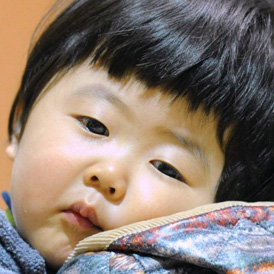Q and A: children of the Japan earthquake
Hannah Thompson, emergency protection adviser for the charity Save the Children, tells Channel 4 News how the youngest victims of the Japanese earthquake are in urgent need of support.

What is the situation on the ground in Japan?
We know that up to 100,000 children are displaced as the result of the Japanese earthquake and tsunami.
Many children are scared. They are living in temporary shelters, with limited food, shelter and comfort. We know that the situation is not good for children.
We are looking to be based out of Sendai, near the epicentre of the earthquake. We have also deployed teams in Miyagi Prefecture and at evacuation centres qhere children are living in temporary accommodation across northeast Japan.
How are children in particular affected by disasters like this?
Children are often doubly stressed because they experience their own stress as well as that of their parent or carer. They have experienced traumatic events and they find it difficult to express that in the way adults would.
In addition, they bear the brunt of what their families are going through. Their parents are often short-tempered and worried about the future. Children pick up on that.
What are the potential psychological effects?
Children who have been through such a traumatic experience will have ongoing fear and short-term behavioural changes. If you don’t catch that early on and give them a way to express it, they can suffer mental health problems and physical problems later on.
Children typically will be unable to sleep. They’ll start bedwetting. They’ll be withdrawn and antisocial. They may stop talking. These are all signs of distress.
If you disrupt a child’s path of development, you can disrupt their whole education and wellbeing later on in life.
What is Save the Children doing?
We are assessing the needs of children and looking to set up child-friendly spaces where they can play, dance, draw. It’s a place for children to be able to express all their feelings and it gives parents the time to rebuild their homes and livelihoods and get back to reality.
We spoke to an eight-year-old boy called Yuto. He has been sheltering on the floor of a school in Asahi, living there with his mum, two sisters and a newborn baby. He says he wants to go home but there is no clean water in his home.
He can’t sleep and he’s too worried to play. We can’t stress enough how important playing is in being able to express and cope with feelings of distress.
What’s the charity’s top priority?
With the help of the government and the military, Japan will be able to address the basic needs that we so often find are lacking disaster zones. We are looking at providing the additional psychosocial support that’s so important for people who have never experienced anything like this before.
Save the Children Japan have been working in the country for 25 years. They have an understanding of the context and the issues. Our priority is supporting children and working very closely with the government and other agencies.
What we bring to it is the specialism of protecting children.
What can people in the UK do to help?
They can donate to our campaign, which aims to raise £1 million to help families affected by the earthquake and tsunami. They can visit our website or call the appeal number, 020 7012 6400.
We’re having lots of calls from members of the British public. Lots of people are calling in and asking how they can help.